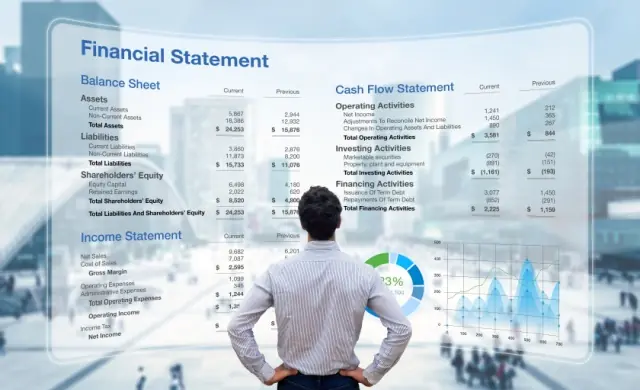A financial presentation is vital for businesses to communicate their financial health. It presents reports, explains financial positions, or delivers detailed analyses. The goal is to simplify complex financial data for easier understanding. An engaging presentation covers income statements, balance sheets, and cash flow insights. It helps your audience understand your organisation’s performance.
In this guide, we’ll explore the essentials of financial presentations, including their structure and purpose. We’ll also share actionable tips to make your financial report presentation impactful. Whether preparing for a board meeting, pitching to investors, or updating your team, these insights will help you present financial data with clarity and professionalism.

What is a Financial Presentation?
A financial presentation is a structured way to communicate an organisation’s financial data to its audience. It provides a snapshot of the company’s financial position, offering insights into key areas like revenue, expenses, assets, and cash flow.
Unlike a static financial report or financial statement, a financial presentation tells a story using data. Visual aids such as graphs, charts, and infographics are often used to illustrate trends and insights. These help transform dense spreadsheets into compelling visuals. Tailoring the presentation to the audience—whether investors, stakeholders, or internal teams—ensures relevance and engagement.
A financial presentation focuses on clear communication and strategic data storytelling. It helps organisations build trust, showcase their strengths, and inspire informed decision-making.

10 Reasons Why Financial Presentations Matter for Businesses
Financial presentations are indispensable for communicating a company’s financial story. Here’s why every business should invest in well-designed financial report presentations:
1. Simplifies Complex Data
Breaks down intricate financial data into digestible visuals, helping stakeholders understand key insights without the need for in-depth analysis.
2. Showcases Key Financial Statements
Highlights critical financial documents like income statements and balance sheets, offering a clear overview of financial performance.
3. Aids Decision-Making
By presenting accurate and concise data, these presentations equip leadership teams with the information needed to make informed decisions.
4. Engages Stakeholders
Visuals like charts and graphs make presentations more engaging, enabling audiences to grasp financial trends quickly.
5. Builds Professionalism
A polished financial presentation demonstrates professionalism, boosting credibility with investors and stakeholders.
6. Enhances Investor Relations
Investors gain a clear view of financial health and growth potential, fostering stronger relationships and encouraging investment.
7. Promotes Transparency
Transparent data presentations build trust, demonstrating the company’s commitment to open communication.
8. Supports Compliance
Regularly updated presentations help meet regulatory requirements, ensuring legal and financial accuracy.
9. Encourages Feedback
Interactive financial presentations invite questions, helping businesses address concerns and improve their strategies.
10. Increases Stakeholder Confidence
Well-structured presentations reinforce trust, ensuring stakeholders remain confident in the company’s financial management.

Key Components of a Financial Report Presentation
A financial report presentation should be comprehensive yet concise. Here are the essential elements:
1. Income Statement
Provides details on revenue, expenses, and profit over a specific period, showcasing the company’s financial performance.
2. Balance Sheet
Summarises assets, liabilities, and equity, offering insights into financial stability and solvency.
3. Cash Flow Statement
Tracks cash inflow and outflow, illustrating liquidity and operational efficiency.
4. Key Ratios
Metrics such as profit margins, debt-to-equity ratios, and current ratios help evaluate financial health.
5. Expense Analysis
Breaks down costs by category, revealing areas for optimisation or growth.
6. Financial Highlights
Summarises critical achievements, such as revenue growth and profitability, for quick reference.
7. Future Projections
Outlines expected financial performance, helping stakeholders understand growth strategies and market opportunities. Stay ahead with the Presentation Design Trends for 2025 to craft forward-thinking financial presentations

How to Deliver an Effective Financial Presentation
1. Understand Your Audience
Tailor your content to your audience’s level of financial expertise, ensuring they can engage with and understand the information presented.
2. Use Visual Aids
Incorporate visuals like graphs, charts, and infographics to make complex data more accessible. Tools like PowerPoint or Google Slides can enhance clarity and engagement.
3. Start with Key Takeaways
Begin with a summary of the most critical insights to grab attention immediately.
4. Create a Narrative
Present your financial data as a story, highlighting key trends, comparisons, and the impact of business decisions.
5. Keep Slides Simple
Limit text and focus on visuals. Following the 7×7 rule—no more than seven lines per slide—keeps content digestible. When designing financial report presentations, it’s worth exploring the strengths of various tools. Check out our comparison of Google Slides vs. PowerPoint to choose the best platform for your needs
6. Practice and Prepare
Rehearse your presentation to ensure smooth delivery. Be ready to answer questions confidently with supporting data.

Why Choose Presentation Support for Financial Presentation Design?
A professional financial presentation turns your data into a compelling story. It helps your audience connect with your message. At Presentation Support, we create visually stunning and effective financial presentations. We tailor these to meet your goals. Whether it’s for an investor meeting, stakeholder update, or board presentation, we ensure your message is clear and impactful.
Explore our Portfolio and learn about our services to see how we’ve helped organisations enhance their presentation game. Check out our blog on Professional Pitch Decks for more insights on crafting persuasive presentations.
If you’re ready to make your financial presentations stand out, Contact us today! Let’s create presentations that make a difference.







